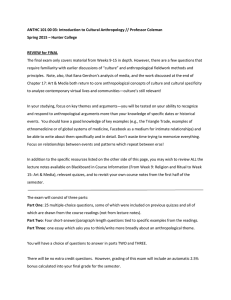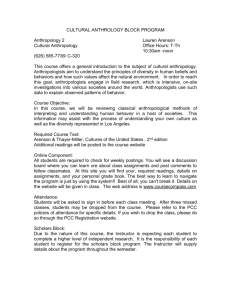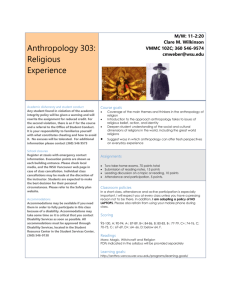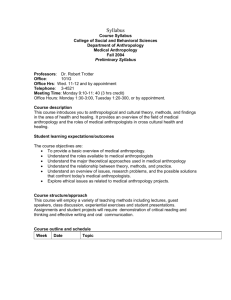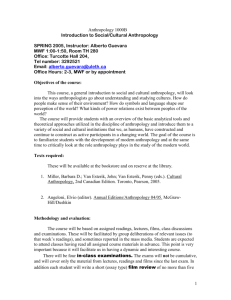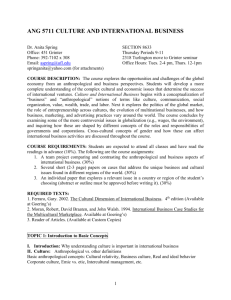Ant 603 - NAU jan.ucc.nau.edu web server
advertisement
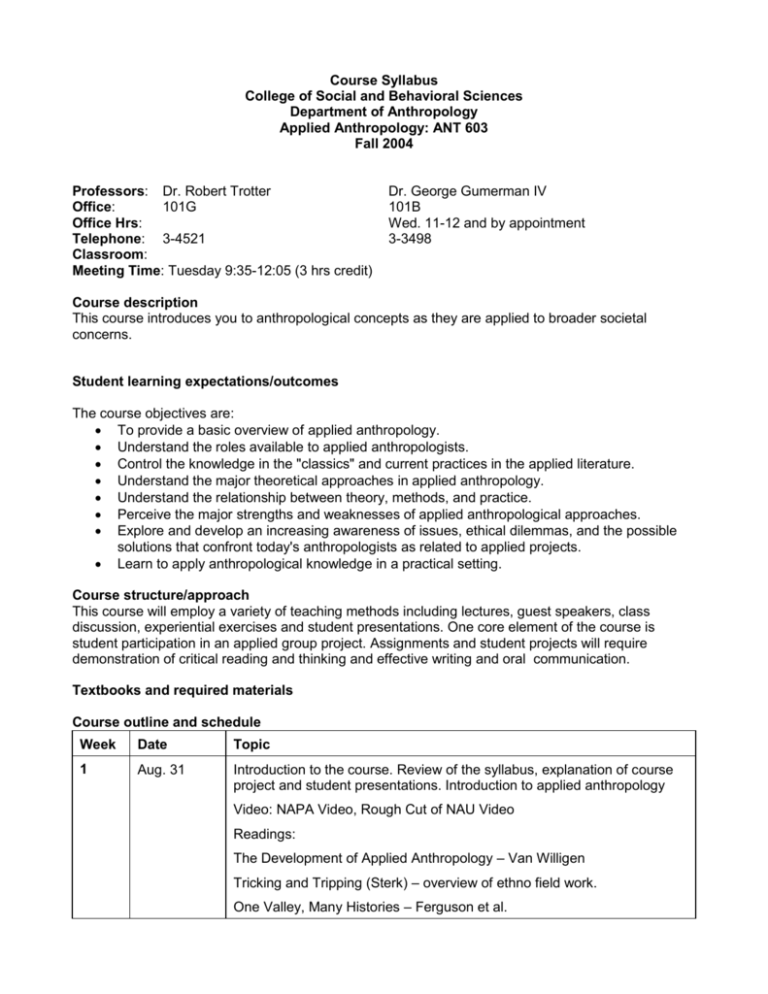
Course Syllabus College of Social and Behavioral Sciences Department of Anthropology Applied Anthropology: ANT 603 Fall 2004 Professors: Dr. Robert Trotter Office: 101G Office Hrs: Telephone: 3-4521 Classroom: Meeting Time: Tuesday 9:35-12:05 (3 hrs credit) Dr. George Gumerman IV 101B Wed. 11-12 and by appointment 3-3498 Course description This course introduces you to anthropological concepts as they are applied to broader societal concerns. Student learning expectations/outcomes The course objectives are: To provide a basic overview of applied anthropology. Understand the roles available to applied anthropologists. Control the knowledge in the "classics" and current practices in the applied literature. Understand the major theoretical approaches in applied anthropology. Understand the relationship between theory, methods, and practice. Perceive the major strengths and weaknesses of applied anthropological approaches. Explore and develop an increasing awareness of issues, ethical dilemmas, and the possible solutions that confront today's anthropologists as related to applied projects. Learn to apply anthropological knowledge in a practical setting. Course structure/approach This course will employ a variety of teaching methods including lectures, guest speakers, class discussion, experiential exercises and student presentations. One core element of the course is student participation in an applied group project. Assignments and student projects will require demonstration of critical reading and thinking and effective writing and oral communication. Textbooks and required materials Course outline and schedule Week Date Topic 1 Aug. 31 Introduction to the course. Review of the syllabus, explanation of course project and student presentations. Introduction to applied anthropology Video: NAPA Video, Rough Cut of NAU Video Readings: The Development of Applied Anthropology – Van Willigen Tricking and Tripping (Sterk) – overview of ethno field work. One Valley, Many Histories – Ferguson et al. 2 Sept. 7 Overview to applied theory and practice both Topics: Definitions of Culture, Theory and Bridging Theory to Application Readings: Downum and Price Wolfe and Fiske: Introduction Rylko-Bauer et al. : Strategies for Increasing the Use of Anthropological Research Gumerman and Gumerman, archaeological practice and theory. Trotter : Advanced Methods (Ethos) Article Project Description 3 Sept. 14 Faculty Forum Readings: TBA 4 Sept 21 Who owns culture? Knowledge, Property rights, and cultural Processes. Bob Topics: Intellectual Property Rights, Resource Claims Readings: BioPiracy Vandana Shiva How sushi went global. Bestor Using Stakeholders in the Research Process (Drake) in Van Willigen Wood and Powell: Ethos for Archaeological Practice MacQueen et al. What is Community? 5 Sept 28 Cultural Preservation: Who Determines what gets preserved? Wolf Topics: Preserving cultural elements: language, Religion, Food, Material Culture, and Education. Cultural Resource Management Hinton: Language Revitalization Trotter and Chavira: Curanderismo Vasquez and Jenkins: Reciprocity and Sustainability The Price of Progress (unintended consequences) Bodley Tribal Cultural Resource Management Stapp 6 Oct. 5 Wolf Project Debriefing on Progress 7 Oct. 12 Bob Who am I? Where do I come from? And where am I going? Topics: Cultural Identity and representation, Power, Autonomy, Ethnic Nationalism, Patriotism and other forms of ethnocentrism Readings: Body Ritual among the Nacerima. Minor White Priviledge: Unpacking the Invisible Knapsack – McIntosh I am Joaquim: Corky Gonzales Gullah (TBA) Ozette Video 8 Oct. 19 Learning Culture and Passing it on Bob Topics: Acculturation and Enculturation Readings: To Give up Words-Basso An Orthagonal Theory of Acculturation: Oetting and Beauvais The Alcoholic Agringado: William Madsen Style and Social Information: Wissner 9 Oct. 26 Learning Culture and Passing it on cont. Wolf Topics: Entertainment, Public Education, and Cultural Tourism Readings: CD ROM: Interactive Archaeology of the Grand Canyon and Colorado Plateau. Gumerman et al. Tourism with Race in Mind: Logan and Leone Many Publics of Archaeology: McManamon The Gods Must Be Crazy (video) 10 Nov. 2 Project Progress Reports 11 Nov. 9 How do anthropologists work with Culturally Diverse Communities Bob Topics: Planning, Representation, Collaborative Research, Community Organization, Advocacy, Activitism Readings. Race without Color –Diamond Of Kwanzaa, Cinco de Mayo and Whispering: The need for intercultural education – Lustig Crossing the Minefield: Politics of Refugee Research and Service – MacDonald. Policy and Community Action Research: The Farm Worker Movement in California – Barger and Reza 12 Nov. 16 Wolf Is technology relevant? Topics: Technology and Culture, Digital Divide, Virtual Culture, Technological Revival, Revitalization Movements Native Peoples and the Challenge of Computers: Bowers, Vasquez, Roaf Modeling Relationship Dynamics in GM-Research Institution Partnerships. Sengir et al. Anthropology in the Technology Industry - Guest Video: Tihuanacu 13 Nov. 23 Wolf Culture and Environment Topics: Ecosystem change, sustainability, Revitalization, Restoration, Activisim Readings: Siebert (Thesis) Of Land and Culture: (Thesis) Ernest Atencio, Two Rights make a wrong- Murray. Guest Lecture: Siebert 14 Nov. 30 Ethical considerations for Applied Anthropology Bob Some Ethical Issues and Resources in Anthropology - Wax Law, Custom, and Crimes against Women – Van Willigen and Channa AAA Code of Ethics TBA 15 Dec. 7 Teams work on Project Reports Finals Week Dec. 14 Student Team Presentations Course content may be changed at Instructors option, including addition of readings or topics. Assessment of student learning outcomes: Student performance and learning will be assessed through the following: This course requires a significant amount of reading and class participation. You are required to be prepared for lectures by reading the assigned readings so that they can be discussed in class. Grading system Class attendance and discussion In Class Power Point Presentation of Applied Topic Group Museum Project a. Project Design (formal written design) b. Project Data Base c. Project Deliverable 50 100 (200 total) 100 50 100 d. Project Presentation Individual Course Paper (Theory Review on Topic of Choice) Total Course Points = 100 100 ____ 600 Point Equivalents: A = 90-100 percent of point total, B = 89-80 percent, Below 80 percent equals C or lower grade (in descending 10 percent increments). All evaluation and grading practices will follow University policy. Any assignment handed in after the due date will result in ten percent loss in credit per day late. The professors reserve the right to make changes to this course, including grading system. Course policy: Academic integrity Unless specifically directed to work with other students, each student must do his/her own work. Academic dishonesty is entirely unacceptable. Students charged with academic dishonesty are subject to the Arizona Board of Regents= Code of Conduct and procedures established by NAU and outlined in the Student Handbook. Students with Learning Disabilities/Physical Handicaps (attached) Safe Working and Learning Environment (attached)
